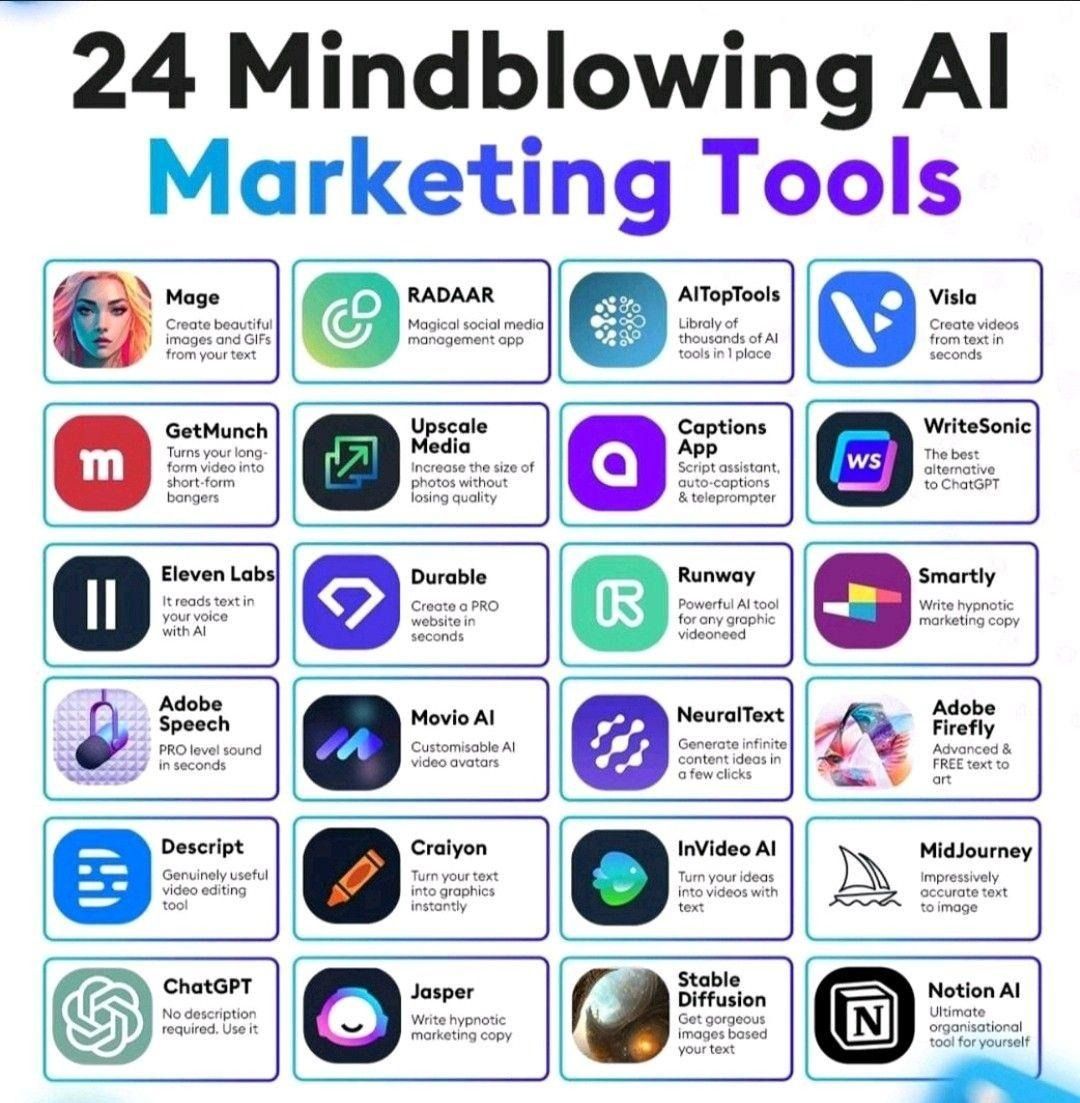

In the ever-evolving world of marketing, AI tools have become indispensable for automating and scaling campaigns. Let’s learn more about this topic below with Bottle Flip, as we explore the top AI marketing tools that can revolutionize your strategies and boost your results.
Artificial Intelligence (AI) has transformed the marketing landscape, offering unprecedented opportunities for businesses to streamline their operations and enhance their campaigns. These tools leverage advanced algorithms and machine learning capabilities to analyze vast amounts of data, predict consumer behavior, and automate various marketing tasks. The integration of AI in marketing strategies has become crucial for staying competitive in today’s fast-paced digital environment.
One of the key advantages of AI marketing tools is their ability to process and interpret large volumes of data quickly and accurately. This enables marketers to gain valuable insights into customer preferences, market trends, and campaign performance. By harnessing the power of AI, businesses can make data-driven decisions, optimize their marketing efforts, and achieve better results. The use of AI tools also allows for personalization at scale, ensuring that marketing messages are tailored to individual customers’ needs and preferences.
As we delve deeper into the world of AI marketing tools, it’s important to note that while these technologies offer tremendous benefits, they should be used in conjunction with human creativity and strategic thinking. The goal is to leverage AI to enhance and support marketing efforts, rather than replace human expertise entirely. With this in mind, let’s explore some of the top AI marketing tools that can help automate and scale your campaigns effectively.
In this section, we’ll discuss some of the most powerful AI marketing tools available today. These tools cover various aspects of marketing, from content creation and social media management to email marketing and customer segmentation. By incorporating these tools into your marketing strategy, you can significantly improve your efficiency and effectiveness.
AI-powered content creation tools have revolutionized the way marketers produce and optimize their content. These tools can generate high-quality written content, suggest improvements, and even create visual assets. Some notable AI content creation tools include:
1. GPT-3 based writing assistants: These tools use advanced language models to generate human-like text, helping marketers create blog posts, social media content, and product descriptions more efficiently.
2. AI-powered image and video generators: These tools can create custom visuals and video content based on text prompts, saving time and resources in content production.
3. Content optimization platforms: AI-driven tools that analyze your content and provide suggestions for improvement, ensuring that your content is SEO-friendly and aligned with your target audience’s preferences.
By leveraging these AI content creation tools, marketers can produce a higher volume of quality content in less time, allowing them to scale their content marketing efforts effectively. The Bottle Flip phenomenon, for instance, could be analyzed and incorporated into content strategies using these AI tools to capitalize on trending topics and engage audiences more effectively.
Social media plays a crucial role in modern marketing campaigns, and AI tools have made it easier than ever to manage and optimize social media presence. Some of the top AI-powered social media tools include:
1. AI-driven social media scheduling platforms: These tools use machine learning algorithms to determine the best times to post content for maximum engagement.
2. Social listening and sentiment analysis tools: AI-powered platforms that monitor social media conversations and analyze public sentiment towards your brand or products.
3. Automated chatbots for social media: AI chatbots that can handle customer inquiries and provide instant responses on social media platforms.
These tools enable marketers to streamline their social media management processes, gain valuable insights from social data, and improve engagement with their audience. For example, a brand capitalizing on the Bottle Flip trend could use AI social listening tools to track mentions and sentiment around the topic, allowing them to tailor their content and engagement strategies accordingly.
AI has transformed email marketing by enabling advanced personalization and optimization techniques. Some of the top AI-powered email marketing tools include:
1. AI-driven email content generators: Tools that can create personalized email content based on user data and preferences.
2. Send time optimization tools: AI algorithms that determine the best time to send emails to individual recipients for maximum open rates.
3. Dynamic content optimization platforms: Tools that automatically adjust email content based on recipient behavior and preferences.
These AI email marketing tools allow marketers to create highly personalized and effective email campaigns at scale. By leveraging user data and machine learning algorithms, these tools can significantly improve email open rates, click-through rates, and overall campaign performance.
Analytics and predictive marketing tools powered by AI have become essential for data-driven decision-making and campaign optimization. These tools offer advanced capabilities for analyzing marketing data, predicting consumer behavior, and optimizing campaign performance.
AI-powered customer segmentation tools use machine learning algorithms to analyze customer data and identify distinct segments based on various factors such as demographics, behavior, and preferences. Some key features of these tools include:
1. Automated customer profiling: AI algorithms that create detailed customer profiles based on various data points.
2. Predictive segmentation: Tools that use historical data to predict future customer behavior and segment audiences accordingly.
3. Real-time segmentation updates: AI-driven platforms that continuously update customer segments based on new data and changing behaviors.
By leveraging these AI-powered segmentation tools, marketers can create highly targeted campaigns that resonate with specific customer groups. This level of precision in targeting can lead to improved campaign performance and better ROI. For instance, a campaign related to the Bottle Flip trend could use AI segmentation to identify and target audiences most likely to engage with this type of content.
AI-driven predictive analytics tools help marketers forecast future trends, customer behavior, and campaign performance. These tools use machine learning algorithms to analyze historical data and identify patterns that can inform future marketing strategies. Some key features of predictive analytics tools include:
1. Sales forecasting: AI models that predict future sales based on historical data and market trends.
2. Customer lifetime value prediction: Tools that estimate the long-term value of customers based on their behavior and purchase history.
3. Campaign performance forecasting: AI algorithms that predict the potential performance of marketing campaigns before they are launched.
By utilizing these predictive analytics tools, marketers can make more informed decisions about resource allocation, campaign planning, and overall marketing strategy. This data-driven approach can lead to more effective campaigns and better long-term results.
Artificial Intelligence has revolutionized the world of digital advertising by introducing sophisticated tools for ad optimization and bidding. These AI-powered platforms help marketers maximize their ad spend and improve campaign performance across various channels.
Programmatic advertising platforms use AI algorithms to automate the buying, placement, and optimization of digital ads. These platforms offer several advantages:
1. Real-time bidding: AI-driven algorithms that make split-second decisions on ad placements based on user data and campaign goals.
2. Dynamic creative optimization: Tools that automatically adjust ad creatives based on user preferences and behavior.
3. Cross-channel optimization: AI systems that optimize ad placements across multiple channels and devices for maximum impact.
By leveraging programmatic advertising platforms, marketers can achieve better targeting, improved ad relevance, and higher ROI for their digital advertising campaigns. These tools are particularly useful for scaling campaigns across multiple channels and reaching specific audience segments effectively.
AI bid management tools use machine learning algorithms to optimize bidding strategies for paid search and social media advertising. These tools offer several key features:
1. Automated bid adjustments: AI algorithms that continuously adjust bids based on real-time performance data and campaign goals.
2. Performance forecasting: Predictive models that estimate the impact of different bidding strategies on campaign performance.